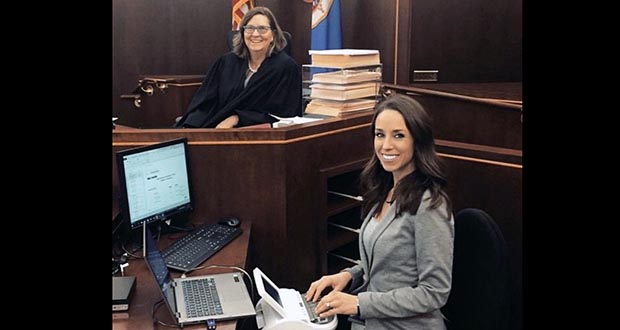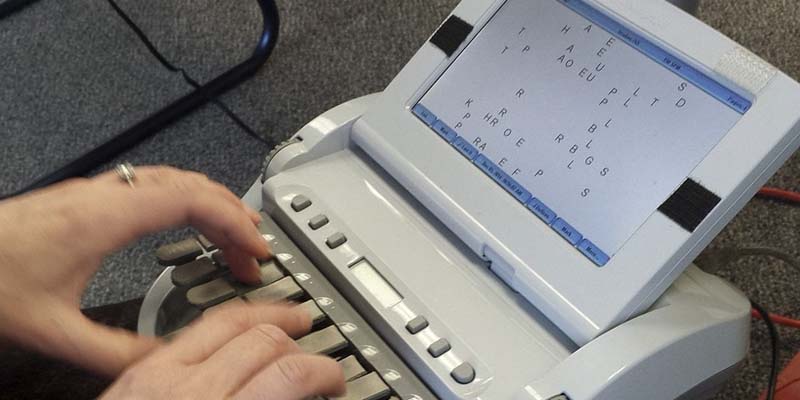Durham court reporting vs. digital recording: key differences
Everything About Court Reporting: Necessary Insights Into Its Relevance in Law
Court reporting offers a crucial feature within the legal structure, giving a precise and dependable document of proceedings. Via innovative strategies and tools, court reporters record the subtleties of statements and lawful dialogue. The relevance of their work prolongs beyond plain transcription. As the legal landscape progresses, so also does the role of innovation in court reporting. Comprehending these dynamics exposes much deeper implications for justice and transparency in the legal system.
The Duty of Court Reporters in the Legal System

Commonly forgotten, court press reporters play a crucial role in the legal system by ensuring a accurate and verbatim record of proceedings. Their main responsibility involves transcribing talked words throughout tests, depositions, and other legal events, which acts as an official document for future referral. This paperwork is essential for allures, as it supplies the needed details for evaluating decisions made by courts and judges.
Stenotype reporter must have remarkable paying attention abilities and a deep understanding of legal terminology to record the subtleties of statement and argumentation precisely. Their work contributes to transparency within the judicial procedure, enabling liability and fairness. Furthermore, they promote accessibility to justice by making records readily available to entailed celebrations, guaranteeing that everyone has the possibility to examine the proceedings. In this means, stenotype reporter maintain the integrity of the lawful system, strengthening the importance of precise communication in issues of legislation.
Techniques and Devices Made use of in Court Reporting
In court reporting, numerous techniques and devices enhance the precision and efficiency of transcription. Stenography modern technology plays a significant duty, enabling press reporters to capture talked words quickly, while digital recording approaches provide different options for documents. Comprehending these devices is important for grasping exactly how stenotype reporter satisfy their critical function in the lawful system.
Stenography Modern Technology Summary
Stenography modern technology functions as the foundation of modern-day court reporting, making it possible for reliable and exact transcription of spoken dialogue. Using specialized equipments known as stenographs, court press reporters can capture speech at amazing rates, often surpassing 200 words per min. These makers use a distinct keyboard design that permits several tricks to be pushed at the same time, producing phonetic depictions of words - durham court reporting. This approach lessens the demand for extensive spelling and improves transcription accuracy. Furthermore, stenographers utilize different shorthand strategies and icons to more simplify the procedure, ensuring that no information is forgotten throughout process. The assimilation of stenography modern technology not just cultivates efficient communication in legal settings but also supports the integrity of the judicial process by providing dependable and accurate documents of discussions
Digital Recording Techniques
A boosting number of court reporting professionals are turning to electronic recording approaches to boost the precision and performance of their transcriptions. These methods use advanced sound and video modern technology to record process in real-time. Digital recorders, usually paired with top quality microphones, guarantee that every word talked is protected with clarity. Moreover, specialized software program can record audio files instantly, enabling quicker turnaround times. Some experts incorporate double recording systems for redundancy, guaranteeing no crucial information is shed. In addition, electronic recordings can be easily indexed and looked, helping with speedy retrieval of specific sectors. As legal settings develop, accepting these digital devices not only simplifies the reporting process yet also preserves the integrity of the document.
The Importance of Precision in Transcription
Precision in transcription is vital in court reporting, as it guarantees that legal documents reflect real content of procedures. This accuracy can significantly affect case results, influencing the decisions made by discretionary. Maintaining high requirements of precision is extremely important in the lawful occupation.

Accuracy in Lawful Records
The lawful system counts greatly on eloquent arguments and convincing rhetoric, the real backbone of judicial process exists in the accuracy of lawful documents. Exact transcription is important, as it ensures that every declaration, inquiry, and judgment is recorded appropriately. Such accuracy offers numerous objectives, consisting of giving a reputable reference for charm processes and preserving the stability of the judicial system. Errors in transcription can result in misunderstandings, misinterpretations, and potentially damaging repercussions for all celebrations included. Court press reporters should possess remarkable abilities and focus to information, as their work straight influences the clearness of legal documents. Ultimately, the precision of lawful records underpins the trust positioned in the judicial process, reinforcing the significance of meticulous transcription.

Influence On Instance Outcomes
When lawful procedures unfold, the accuracy of transcription typically dictates the trajectory of an instance's end result. Exact court reporting guarantees that every word talked is successfully caught, enabling juries, courts, and attorneys to make informed choices based upon the record. Mistakes in transcription can result in misunderstandings, false impressions, and potentially unjustified decisions. The integrity of lawful files counts heavily on the precision of these records, as they function as the structure for allures and further legal activities. In high-stakes situations, where the implications are profound, the function of a court press reporter ends up being also more vital. Maintaining extensive standards in transcription not just sustains the legal process yet likewise promotes the principles of justice and fairness in the court room.
Court Reporting in Different Legal Setups
Court reporting plays an important role across different lawful setups, ensuring that procedures are accurately recorded for future reference. In criminal court, stenotype reporter transcribe testaments, proof, and judicial rulings, which are important for appeals and case evaluations. In civil lawsuits, precise records assist in the exploration procedure and provide a trustworthy document for trial procedures. Additionally, management hearings often rely upon stenotype reporter to preserve a main document, ensuring transparency and accountability in governmental processes. Household courts likewise take advantage of court reporting, as precise paperwork of procedures can influence protection choices and negotiations. In addition, depositions in pre-trial phases need accurate recordings to catch the nuances of witness testimonies, which might be significant in forming situation methods. In general, court reporting serves as a cornerstone in the lawful system, promoting fairness and clarity throughout varied judicial atmospheres.
The Impact of Modern Technology on Court Reporting
As modern technology proceeds to develop, its influence on court reporting has actually ended up being progressively significant. Technologies such as electronic recording, real-time transcription software application, and expert system have actually transformed typical methods. Digital audio recorders currently record court room proceedings with remarkable clearness, allowing stenotype reporter to focus on subtleties and context as opposed to entirely on keying. Real-time transcription innovations enable instant access to records, promoting effectiveness and improving collaboration amongst attorneys. Additionally, man-made intelligence devices are being incorporated to help in the transcription procedure, decreasing human mistake and expediting record generation. In spite of these innovations, the necessary skills of court reporters continue to be indispensable, as they give a nuanced understanding of legal language and court characteristics. Eventually, modern technology matches rather than replaces the experience of stenotype reporter, making sure that the integrity and accuracy of legal paperwork are promoted in a progressively electronic landscape.
Job Opportunities and Pathways in Court Reporting
The evolution of innovation in court reporting has actually opened a range of job opportunities for striving specialists in the field. Commonly, stenotype reporter were largely accountable for transcribing lawful proceedings. Nonetheless, advancements such as electronic recording and real-time reporting have read the full info here actually expanded their roles.
Today, stenotype reporter can concentrate on locations such as captioning for television programs, providing transcription services for lawful firms, and working in the corporate industry for depositions or meetings - durham court reporting. Additionally, opportunities in remote reporting, especially as a result of the surge of digital court rooms, have actually ended up being progressively widespread
Educational pathways you can find out more include formal training programs, qualification training courses, and proceeding education and learning to stay upgraded with technological adjustments. Networking within specialist and legal companies likewise plays a substantial duty in profession advancement. Generally, the diverse chances in court reporting reflect the vibrant nature of the lawful career and the increasing demand for knowledgeable specialists.
The Future of Court Reporting in an Evolving Legal Landscape
Just how will the duty of court reporting adjust as the legal landscape proceeds to evolve? As innovation advances, court reporting is most likely to welcome cutting-edge tools such as expert system and real-time transcription software program. These innovations may improve precision and performance in recording legal procedures. Additionally, the boosting prevalence of remote hearings necessitates that stenotype reporter end up being adept in electronic platforms, making certain seamless documents no matter place.
All at once, court reporters will certainly need to adjust their skills to handle brand-new types of situations, such as those entailing cyber law and copyright disagreements, which require specialized understanding. In addition, the need for instant access to records will certainly push professionals to provide quicker turn-around times without endangering quality. Eventually, the future of court reporting will certainly pivot on an equilibrium between conventional skills and technical assimilation, making certain that the integrity of the lawful process continues to be undamaged in an increasingly digital world.
Frequently Asked Questions
How Do Stenotype Reporter Handle Sensitive Information Throughout Process?

What Qualifications Are Needed to Come To Be a Court Press Reporter?
To come to be a court press reporter, individuals normally need a senior high school diploma, specialized training from a certified program, proficiency in shorthand or voice writing, and certification or licensure, relying on state demands and policies.
Are Court Reporters Required to Have a License?
Court reporters are usually called for to get a certificate, depending upon the jurisdiction. Licensing warranties that they satisfy certain requirements of proficiency and expertise, which is necessary for preserving the honesty of legal proceedings.
Exactly How Do Stenotype Reporter Take Care Of Different Accents and Languages?
Stenotype reporter take care of different accents and languages with considerable training, method, and familiarity with different speech patterns. They frequently make use of specialized software and strategies to accurately record talked words, guaranteeing quality and precision in their records.
What Is the Ordinary Income for a Stenotype Reporter?
The average income for a stenotype reporter varies by area and experience, generally varying from $50,000 to $80,000 annually. In high-demand areas, incomes can go beyond $100,000, reflecting the occupation's relevance and specialized skills.
Typically forgotten, court reporters play a necessary duty look what i found in the legal system by ensuring a verbatim and accurate record of process. In criminal court, court press reporters record testimonies, evidence, and judicial rulings, which are important for allures and instance reviews. Family courts likewise benefit from court reporting, as precise paperwork of process can affect safekeeping choices and settlements. Commonly, court press reporters were primarily responsible for transcribing legal procedures. Today, court press reporters can specialize in locations such as captioning for television programs, offering transcription solutions for legal companies, and functioning in the corporate field for depositions or meetings.